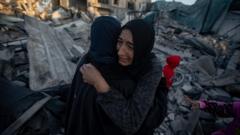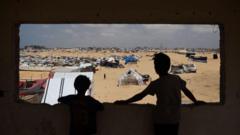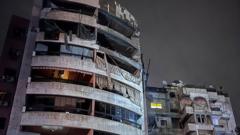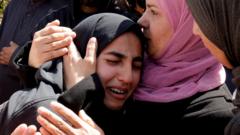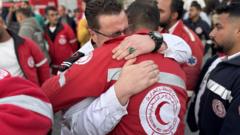As tensions rise, a new evacuation order in Rafah has raised concerns about compliance with international law and the humanitarian impact on civilians.
**Israel Orders Evacuation of Rafah Amid Intensifying Conflict**
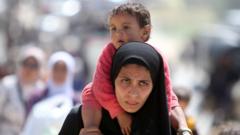
**Israel Orders Evacuation of Rafah Amid Intensifying Conflict**
The evacuation of Rafah in southern Gaza highlights the ongoing humanitarian crisis as military operations escalate.
The Israeli military has announced a significant evacuation order affecting the southern Gaza city of Rafah and surrounding areas, marking the largest directive since military operations resumed earlier this month. The military urged residents to swiftly evacuate to the al-Mawasi humanitarian zone, citing the reinitiation of intense military operations aimed at dismantling the capabilities of terrorist organizations within the region.
Desperate scenes emerged as displaced Palestinians, many of whom had only recently returned to their homes during a two-month ceasefire, began fleeing Rafah. Approximately 20% of Gaza is currently under such evacuation orders, reflecting a growing humanitarian crisis.
The UN's human rights office raised alarming concerns last week, stating that these evacuation orders do not conform to international law, emphasizing Israel’s failure to ensure adequate accommodations and basic needs for those displaced. The Israeli government defended the evacuations, asserting they aim to protect civilians from Hamas fighters, whom they accuse of using the population as human shields.
Tensions escalated with the renewed military campaign against Hamas, initiated after the group reportedly rejected a new US proposal regarding a ceasefire and hostage negotiations. Since March 18, more than 1,000 fatalities have been recorded in Gaza according to the Hamas-run health ministry.
As humanitarian conditions deteriorate, the UN reports that food and medical supplies are running critically low, exacerbated by Israel's blockage of aid deliveries since early March. Prior military operations in Rafah have left significant devastation in the city, which is situated near the border with Egypt, and despite a ceasefire, many residents returned to find their homes in ruins.
Personal accounts reflect the dire situation; Haifa Duhair, a displaced resident, conveyed her struggles of fleeing on foot with her children due to a lack of transportation. "We went home two months ago... even though the house is destroyed," she recounted, highlighting the human impact of the conflict.
In ongoing military actions, Israeli forces reported targeting Hamas installations, leading to further civilian casualties. Eight fatalities, including children and women, occurred in Gaza City as a result of recent airstrikes, alongside operations that reportedly dismantled significant Hamas infrastructures.
The ongoing conflict, reignited following a cross-border attack on October 7, has led to devastating consequences, with over 50,350 lives lost in Gaza according to local health authorities. The situation remains critical, as the international community watches closely for developments.
Desperate scenes emerged as displaced Palestinians, many of whom had only recently returned to their homes during a two-month ceasefire, began fleeing Rafah. Approximately 20% of Gaza is currently under such evacuation orders, reflecting a growing humanitarian crisis.
The UN's human rights office raised alarming concerns last week, stating that these evacuation orders do not conform to international law, emphasizing Israel’s failure to ensure adequate accommodations and basic needs for those displaced. The Israeli government defended the evacuations, asserting they aim to protect civilians from Hamas fighters, whom they accuse of using the population as human shields.
Tensions escalated with the renewed military campaign against Hamas, initiated after the group reportedly rejected a new US proposal regarding a ceasefire and hostage negotiations. Since March 18, more than 1,000 fatalities have been recorded in Gaza according to the Hamas-run health ministry.
As humanitarian conditions deteriorate, the UN reports that food and medical supplies are running critically low, exacerbated by Israel's blockage of aid deliveries since early March. Prior military operations in Rafah have left significant devastation in the city, which is situated near the border with Egypt, and despite a ceasefire, many residents returned to find their homes in ruins.
Personal accounts reflect the dire situation; Haifa Duhair, a displaced resident, conveyed her struggles of fleeing on foot with her children due to a lack of transportation. "We went home two months ago... even though the house is destroyed," she recounted, highlighting the human impact of the conflict.
In ongoing military actions, Israeli forces reported targeting Hamas installations, leading to further civilian casualties. Eight fatalities, including children and women, occurred in Gaza City as a result of recent airstrikes, alongside operations that reportedly dismantled significant Hamas infrastructures.
The ongoing conflict, reignited following a cross-border attack on October 7, has led to devastating consequences, with over 50,350 lives lost in Gaza according to local health authorities. The situation remains critical, as the international community watches closely for developments.


